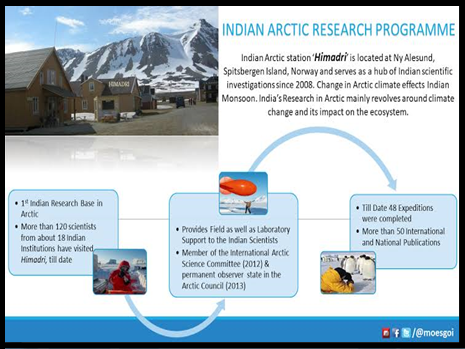INDIA’S FIRST ARCTIC WINTER RESEARCH: SIGNIFICANCE UNVEILED
Why in the News?
- India’s Arctic Research Station, Himadri, at Ny-Alesund will operate throughout the year.
- Marks India’s entry into the select group of nations conducting year-round Arctic research.
About India’s Presence in Arctic :
- Svalbard Treaty: India signed the Svalbard Treaty in 1920; first Arctic expedition occurred in 2007.
- Himadri: Permanent research station, Himadri, operational since 2008, hosts winter expedition in atmospheric sciences, astronomy, and climate studies.
- Research areas : Arctic lightning, precipitation’s role in climate change, radio frequency characterization, and aerosol impact on climate.
| Warming Impact and Global Implications:
· Arctic temperatures have risen by about 4°C in the last century; 2023 recorded the warmest year. · Melting sea ice could lead to global repercussions, influencing sea levels, atmospheric circulation, and tropical weather. · Global warming may make the Arctic more habitable, leading to increased exploration and resource exploitation, triggering geopolitical considerations. |
The winter expedition, facilitated by Norwegian agencies, showcases India’s commitment to comprehensive Arctic research during challenging conditions.




